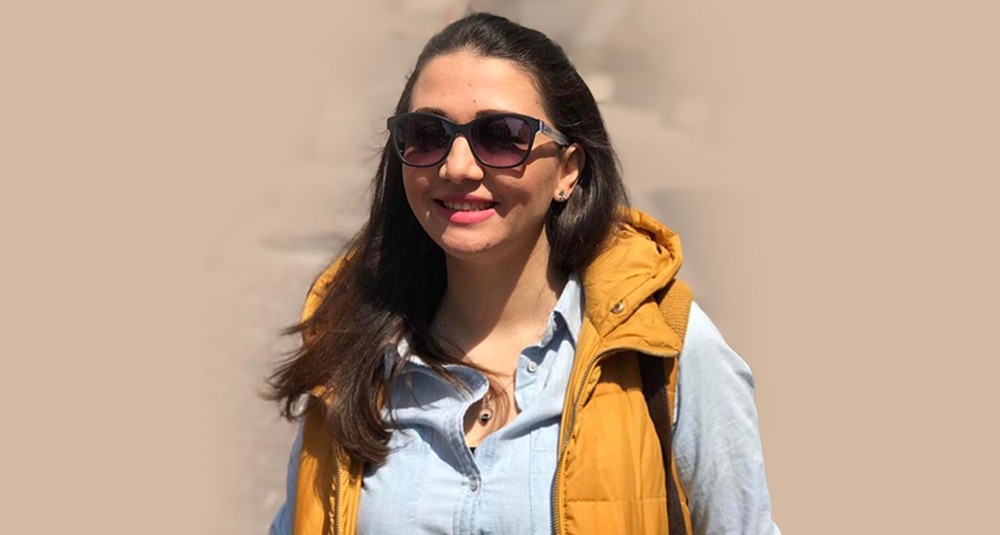Dima al-Sayed
- updated: November 26, 2020
- |
Dima al-Sayed is originally from Homs; she was born in Damascus and she is a graduate of the Institute of Musical Education. She left Syria in 2012 and stayed in Turkey. She works as a journalist and correspondent, interested in women issues and a member of SWPM.
Dima was involved early in the revolution by taking to the streets in demonstrations and providing aid, in addition to attending political lectures. Dima says that she comes from a politically independent family that is not affiliated with any party. She spent most of her childhood apart from her father who has, as she describes, incurred the wrath of the regime, so he was away all the time. He only went back to Syria after the death of Hafez al-Assad. Dima says that this early deprivation of her father was one of the motives for her to partake in the revolution against an unjust and tyrannical regime.
Speaking about the reasons that forced Dima to leave Syria, she says that after one month has passed on the al-Hawla massacre in Homs in 2012, she went with her father and two of her friends to al-Hawla to provide aid for the families there, as she was working in the provision of aid at the time with a group of her friends to support people who were displaced from Homs. Upon their return to Damascus, they started to receive threats from the regime, and indeed, some of her close friends have been detained, so she made her decision to flee for Turkey. Dima worked with several media outlets since she moved to Turkey, such as al-Kul Radio and Rozana Radio. Right now, she works on freelance basis.
Dima’s interest in politics started with the beginning of the revolution. Yet, SWPM is the first political body she actually joins. When she joined in 2018, she found that SWPM represents her in all of its objectives and principles, especially in terms of women issues and rights. She also wanted to be part of the change of society’s perspective to women in general, through joining SWPM, in addition to her main goal which is the political empowerment of women.
Dima always highlights that the politically well-versed male and female members of SWPM should seek to conduct workshops and lectures for awareness raising and political education in topics like negotiations, governance and women rights among other issues, especially for the new members who are enthusiastic to work but lack the experience.
In terms of the challenges facing political activity in Syria, Dima says that the most prominent challenge is the absence of a political atmosphere in general and the lack of democracy under the dictatorship of the Assad regime. As for the challenges facing women in specific in political activity, Dima says that these challenges emanate from the norms and traditions and the society’s general perception of women as being of a lower status than men, in addition to challenges related to changing the mentality of women themselves and their fear of being involved in politics, partly due to the subsequent false stereotype created by society about politically active women. The responsibility to raise the awareness of all groups of society, and the young generation in specific, that women are partners for men in everything rather than a rivalry, lies mainly on the shoulder of women.
Dima highlights that after nine years, all civil and political institutions should unify their efforts to communicate a unified Syrian civil voice, continue to put pressure on the international community and push for the implementation of the demands of the revolution since its eruption. Dima adds that despite all the losses and defeats the revolution has suffered, she still has a lot of motives to continue the struggle to achieve the goals of the revolution. Most importantly, being sincere and loyal to the martyrs of the revolution, releasing detainees, and having hope in building a better future for the coming generations in a civil state and democratic regime that respects the rights and freedoms of citizens, both men and women.
One of the most beautiful moments Dima had experienced in the revolution was meeting the man she loved and married. The hardest moments though, was being under the threat of detention because of her participation in the demonstrations and the revolutionary activity, without taking into consideration the threat that she or her family may be subjected to, in addition to the detention and death of so many of her friends during the years of the revolution.
Dima dreams of a Syria that is civil, stable and colored where all community groups live together with equality, sharing and love, without any kind of discrimination. She says to the women of Syria: “we are strong enough to bring about the change in our country, and to communicate our voices through our work, capabilities and cooperation. We must leave our own fingerprints in the process of change towards a better country. Syrian women have proven that they are not weak. Just be yourself, trust yourself and your powers and don’t be intimidated by anyone.”
